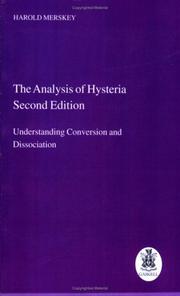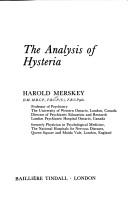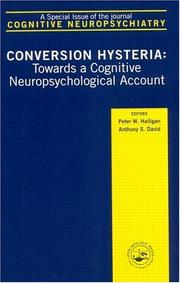| Listing 1 - 10 of 13 | << page >> |
Sort by
|
Book
ISBN: 1032312858 103231284X 9781032312859 9781032312842 Year: 2023 Publisher: London, England: Routledge,
Abstract | Keywords | Export | Availability | Bookmark
 Loading...
Loading...Choose an application
- Reference Manager
- EndNote
- RefWorks (Direct export to RefWorks)
"This manual for clinicians presents a ground-breaking, accessible and unifying new model for understanding Functional Neurological Disorder (FND) that bridges the gap between theoretical FND specific models and the more practical, but non-FND specific CBT models. Grounded in psychology, the Pressure Cooker Model provides a clear metaphor for FND, focusing on intra-individual and inter-individual cognitive, emotional and behavioural processes. Developed based on years of clinical experience in the field, it is applicable to the assessment, and treatment of every type of FND"--
Conversion disorder --- Conversion disorder --- Conversion disorder
Book
Year: 1959 Publisher: New York (N.Y.): International university press
Abstract | Keywords | Export | Availability | Bookmark
 Loading...
Loading...Choose an application
- Reference Manager
- EndNote
- RefWorks (Direct export to RefWorks)

ISBN: 0902241885 Year: 1995 Publisher: London : [Washington, D.C.] : Gaskell ; Distributed in North America by American Psychiatric Press,
Abstract | Keywords | Export | Availability | Bookmark
 Loading...
Loading...Choose an application
- Reference Manager
- EndNote
- RefWorks (Direct export to RefWorks)
Hysteria. --- Conversion disorder. --- Dissociation (Psychology).

ISBN: 0702007242 Year: 1979 Publisher: London Bailliere Tindall
Abstract | Keywords | Export | Availability | Bookmark
 Loading...
Loading...Choose an application
- Reference Manager
- EndNote
- RefWorks (Direct export to RefWorks)
Book
ISBN: 9782848352244 Year: 2012 Publisher: Paris : In press,
Abstract | Keywords | Export | Availability | Bookmark
 Loading...
Loading...Choose an application
- Reference Manager
- EndNote
- RefWorks (Direct export to RefWorks)
Somatic symptom disorder. --- Conversion disorder --- Somatisation --- Conversion (Psychanalyse)
Book
ISBN: 3540488499 Year: 2012 Publisher: Berlin : Springer,
Abstract | Keywords | Export | Availability | Bookmark
 Loading...
Loading...Choose an application
- Reference Manager
- EndNote
- RefWorks (Direct export to RefWorks)
Was wenn Kinder und Jugendliche plötzlich über eigenartige Wahrnehmungen klagen, wenn sie nicht mehr laufen oder stehen können, sie einfach ohne körperlichen Grund umfallen? Traumatische Ereignisse oder Stress können Auslöser dieser Störungsbilder sein. – Nicht jedes Trauma führt zu einer dissoziativen Störung, aber die verstörenden Symptome machen Angst. Dieses Manual gibt Antworten auf die Fragen: - Wie können diese Phänomene verstanden und von anderen psychischen Störungen unterschieden werden? - Gibt es körperliche Erkrankungen, die diese Symptomatik ausgelöst haben könnten? - Was können Therapeuten tun? Alles Wesentliche zu Diagnostik und Therapie finden Sie hier praxisnah erläutert. Die Reihe "Psychische Störungen im Kindes- und Jugendalter" verfolgt drei wesentliche Ziele: Interdisziplinärer Ansatz: Der Patient steht im Mittelpunkt - der Therapeut muss sein Bestes geben, die Störung zu diagnostizieren und adäquat zu behandeln. Kinder- und Jugendpsychiater, Psychiater und Psychologen sind hier gefordert, ihr Wissen beizutragen und über den Tellerrand zu blicken. Praxisrelevanz: Alle Theorie ist grau - diese Reihe gibt Ihnen die Tipps und Tricks an die Hand, mit denen Sie Ihren schwierigen Alltag ein bisschen besser meistern können. Didaktik und Struktur: Alle Bände sind gleich strukturiert und warten mit einer übersichtlichen Didaktik auf. Das Lesen soll Spaß machen und die entscheidenden Informationen müssen schnell erfasst werden können.
Psychiatry. --- Pediatrics. --- Dissociative disorders in children. --- Conversion disorder in children.
Book
ISBN: 2130543545 9782130543541 Year: 2004 Publisher: [Paris] : Presses universitaires de France,
Abstract | Keywords | Export | Availability | Bookmark
 Loading...
Loading...Choose an application
- Reference Manager
- EndNote
- RefWorks (Direct export to RefWorks)
Psychoanalysis. --- Symptoms. --- Conversion disorder. --- Psychanalyse --- Signes et symptômes --- Conversion (Psychanalyse) --- Signes et symptômes
Book
ISBN: 9781107007345 Year: 2011 Publisher: Cambridge : Cambridge University Press,
Abstract | Keywords | Export | Availability | Bookmark
 Loading...
Loading...Choose an application
- Reference Manager
- EndNote
- RefWorks (Direct export to RefWorks)
"Conversion is very common but often misdiagnosed; even when diagnosed, treatment is difficult. It is critical for physicians to have the necessary knowledge to manage these patients in the most effective way. This volume gives all of the available, up-to-date information on when to think about conversion in movement disorders, how to make a diagnosis, how to use the laboratory to support a clinical diagnosis and how to develop a therapeutic plan. Written by experts in neurology, psychiatry, psychology, neuroimaging, neurophysiology and genetics, this book covers psychogenic movement disorders and other conversion disorders from all of the most relevant clinical angles. An accompanying CD-ROM with a video library featuring over 100 real-life examples of movement disorders will aid diagnosis. Neurologists and psychiatrists, as well as others interested in brain pathophysiology at the boundary of neurology and psychiatry, will find this a useful aid to both clinical practice and research"--Provided by publisher.
Psychomotor Disorders. --- Conversion Disorder. --- Movement Disorders. --- Troubles psychomoteurs. --- Conversion (psychanalyse) --- Troubles moteurs. --- Psychomotricité --- trouble --- Psychomotricité --- trouble

ISBN: 0863776515 9780863776519 Year: 1999 Publisher: Hove Psychology press
Abstract | Keywords | Export | Availability | Bookmark
 Loading...
Loading...Choose an application
- Reference Manager
- EndNote
- RefWorks (Direct export to RefWorks)
Conversion disorder --- Cognitive neuroscience --- Conversion Disorder --- Hysteria --- Neuropsychology --- #PBIB:1999.4 --- Conversion (Psychoanalysis) --- Conversion hysteria --- Conversion reaction --- Craft palsies --- Globus hystericus --- Hysterical neurosis, Conversion type --- Defense mechanisms (Psychology) --- Somatoform disorders --- Cognitive neuropsychology --- Cognitive science
Book
ISBN: 0231545312 9780231545310 9780231184083 0231184085 Year: 2019 Publisher: New York
Abstract | Keywords | Export | Availability | Bookmark
 Loading...
Loading...Choose an application
- Reference Manager
- EndNote
- RefWorks (Direct export to RefWorks)
Conversion disorder-a psychiatric term that names the enigmatic transformation of psychic energy into bodily manifestations-offers a way to rethink the present. With so many people suffering from unexplained bodily symptoms; with so many seeking recourse to pharmacological treatments or bodily modification; with young men and women seemingly willing to direct violence toward anybody, including themselves-a radical disordering in culture insists on the level of the body.Part memoir, part clinical case, part theoretical investigation, this book searches for the body. Is it a psychopathological entity; a crossroads for the cultural, political, and biological in the form of care; or the foundation of psychoanalytic work on the question of sexuality? Jamieson Webster traces conversion's shifting meanings-in religious, economic, and even chemical processes-revisiting the work of thinkers as diverse as Benjamin, Foucault, Agamben, and Lacan. She provides an intimate account of her own conversion from patient to psychoanalyst, as well as her continuing struggle to apprehend the complexities of the patient's body. When listening to dreams, symptoms, worries, or sexual impasses, the body becomes a defining trope that belies a vulnerable and urgent wish for transformation. Conversion Disorder names what is singular about the entanglement of the fractured body and the social world in order to imagine what kind of cure is possible.
Conversion disorder. --- Psychoanalysis. --- Psychology --- Psychology, Pathological --- Conversion (Psychoanalysis) --- Conversion hysteria --- Conversion reaction --- Craft palsies --- Globus hystericus --- Hysterical neurosis, Conversion type --- Defense mechanisms (Psychology) --- Hysteria --- Somatoform disorders
| Listing 1 - 10 of 13 | << page >> |
Sort by
|

 Search
Search Feedback
Feedback About UniCat
About UniCat  Help
Help News
News